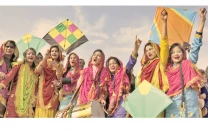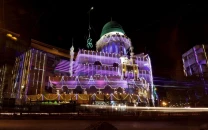Afghan revelations: Pakistan-US secret diplomacy created Doha roadmap
Direct contact between Kerry and Kayani instrumental in breakthrough; Haqqanis no longer on the target list.

Direct contact between Kerry and Kayani instrumental in breakthrough; Haqqanis no longer on the target list. ILLUSTRATION: JAMAL KHURSHID
While the opening of the Taliban office in Doha, Qatar, has captured headlines across the world, wide-ranging interviews with highly-placed diplomatic, military and foreign office sources reveal that this office is but one of the many elements of a complex process, the ultimate aim of which is for all stakeholders in Afghanistan to share power through an inclusive election process under a possibly modified Afghanistan constitution.
“The journey begins now and if all goes well should co-terminate with the exit of the American combat troops and holding of elections in Afghanistan that brings everyone onboard,” says a diplomatic source who has been involved in this process.
Other elements of this process are complete reconciliation with the Taliban led by Mullah Mohammed Omar, multiple-level dialogue between the Taliban and non- Pashtoon groups, agreement on the constitutional framework to govern Afghanistan after safe and trouble-free exit of the US forces from the Afghan soil, gradual cessation of kinetic operations and crucially, dispensing with Hamid Karzai in the political sense in case he tries to subvert peace efforts.
There is little doubt in anyone’s mind that this road is slippery and with no guaranteed success. However, a near-complete and rare alignment of views between the US administration and Pakistan’s policymakers achieved through a robust and out-of-media-glare talks has created space for ‘pulling this one off’, says the source. “There has been some direct dialing between Pakistan and John Kerry, the US secretary of state, working under clear guidelines from president Obama,” says one of Pakistan’s top negotiators.
This direct dialing sometimes bypassed the US embassy in Islamabad while Pakistan’s mission in Washington too stayed pretty much on the margins of what was transpiring between the two capitals.
The main issues that the two sides have had to grapple with all centered around the Taliban’s core leadership led by Mullah Omar.
“The Americans had three solutions for the Taliban problem. First, the Alpha solution, was to beat them into submission and retard their capacity to fight permanently. This failed. The Bravo solution was to fight them hard through a troop surge and force them to accept Afghanistan’s new realities like the presentday Afghan constitution and the leadership of president Karzai. That too did not work. The third, the Charlie solution, was more of a compulsion. Accept Taliban as a legitimate power in Afghanistan, talk to them, accommodate their main demands even it meant abandoning assets like Karzai. I think you are looking at the Charlie solution being played out,” says a military official.
The clearest indication of this radical shift in the US outlook towards the Taliban is in their acceptance that the onceroundly condemned Haqqani Network is essential to peace and deserves to be on the table in Doha. The Haqqanis, who dominate Afghanistan’s troubled and violence-infested eastern provinces, have been Washington hard-liners’ favourite punching bag and recipient of most of the military operations conducted by Isaf and Nato led by the US. Declared as international terrorists their leaders have also been the focus of drone attacks inside Pakistan besides being at the centre of the US accusations of Pakistan being a sanctuary and a safe haven for forces killing American soldiers in Afghanistan.
“The Haqqanis are no longer the bull’s eye of US military operations. They are no longer in the ‘kill or capture and be rewarded’ category. They are part and parcel of the team that would represent Mullah Omar with which Washington is deeply engaged,” says another source at the foreign office.
This ‘deep engagement’ is trilateral and would not have come about without Washington getting exhausted with its stand-alone efforts to cultivate the Taliban minus Islamabad. Pakistani officials say that Washington tried several dialogue processes, in many capitals of the world, some even with low-ranking members of the Haqqani Network, but each time they hit a dead end. No faction could move ahead without the sanction of the Taliban top leadership.
As the costs of war in Afghanistan mounted, and the withdrawal deadline neared, the Obama administration found itself in a bind that could only be circumvented if Mullah Omar agreed to be part of the dialogue.
“The hardliners among the Taliban ranks did not want to give any space to US forces. They had realised that by stalemating international forces they had actually won militarily. They would not concede an inch of diplomatic space to the US who, in their perception, had lost out in the battlefield,” explained a high-ranking foreign office official involved in talking to the Taliban.
“It was then Pakistan’s turn to use its influence even though everyone in Washington had deep doubts about the Taliban showing flexibility. Our pitch to the Taliban was that by becoming part of the dialogue process they could gain international sanction, end conflict peacefully and achieve their goals of foreign forces exiting their country much more swiftly than through perpetual conflict that offered total victory to nobody.
“We also had to argue long and hard with Washington to change the sequence of its demands and instead of asking for the Taliban to straightway accept the Afghan constitution and abjure violence let confidence-building measures take place that would start the process of reconciliation,” says the foreign office official. The same sources also said that the real breakthrough in these negotiations came through personal diplomacy between John Kerry and Pakistan’s Army chief Gen Ashfaq Parvez Kayani.
“With the election fever gripping the country the (outgoing) government in Pakistan had lost all interest in even looking at the notes of some of these important meetings much less taking active interest in spearheading the country’s role in this regard. Kerry-Kayani duo was the centerpiece of this heightened diplomacy. The two had an excellent equation even before Kerry became the secretary of state. Now they talk more frequently than anyone in the press gets to report on,” said the foreign office source.
What transpires in these frequent calls is anybody’s guess, but this interaction did yield a crucial breakthrough a few weeks ago when the Taliban shared a draft of their statement with Washington which was seen and appreciated by everyone at the State Department and the White House.
“The Taliban in that statement had shown an unequivocal commitment to peace and the constitutional process achieved through dialogue besides reiterating the stance that they would not let their soil be used for attacking the US. The same statement also included a critical element of the Taliban distancing themselves from al Qaeda,” says a diplomatic source who worked closely with Pakistan’s embassy in Kabul and claims to have seen several drafts of that letter. This statement was to be followed by statements of approval from Qatar, Pakistan and of course Washington, joined in by other western powers.
“This was much more than Washington was hoping to get out of the Taliban. Frankly, the situation that the US was in, they could have simply settled for the Taliban becoming part of the electoral process,” said a foreign office source. Washington’s glee was reflected in a string of congratulatory calls and messages senior diplomatic and military officers started to receive upon getting the final draft of the Taliban statement.
“This showed what a big deal it was for them (in Washington),” said the same source.
Prior to this engagement with Washington Pakistan also facilitated a quiet and effective dialogue process between the non-Pashtoon forces (the Northern Alliance) and the Taliban in which the two sides at a senior level agreed to bury the hatchet and work jointly for stabilising Afghanistan.
“This was a big breakthrough because this made our peace efforts truly all-inclusive and curtailed the voices of discord and divisiveness that could have raised questions about our motives”, said a senior military source.
One such voice was and continues to be that of Afghanistan’s maverick president Hamid Karzai, who according to Pakistani officials, tried his level best to somehow prevent a direct interface between the Americans and the Taliban and create an impression that he and not Islamabad holds the key to the Afghan endgame.
“Even in opening the office of the Taliban in Doha his concern was that this should be done through his offices in Kabul, an effort that had no takers from any other quarter and therefore fell flat,” says a senior foreign office official.
Karzai’s increasing isolation was proven yet again when Washington, his main backer, stopped counting on him and accepted direct dialogue with the Taliban as the mainstay of their diplomatic push in Afghanistan. This fulfilled a major demand of the Taliban leadership that does not recognise the government in Kabul and wants to have no truck with Karzai.
The beleaguered Afghan president got squeezed on the other fronts as well. As non- Pasthoons began to open up to the Taliban even the High Peace Council, headed distanced itself from the daily barrage of Karzai’s brutal criticism of Pakistan.
A diplomatic source shared with this scribe some contents of recent meetings between Pakistani officials and members of the High Peace Council which clearly indicate a gaping chasm between them and Karzai. He is variously described as ‘unstable’, ‘a threat to Afghan peace’ and even as a ‘poisonous roadblock’.
Unfortunately for Karzai Washington increasingly finds itself in agreement with these assessments, some of which echo those done by senior US officials themselves of the man. That is why when day before yesterday the Afghanistan president raised hell over the Taliban’s office in Doha styling itself as a mission of the Islamic Emirate of Afghanistan, Washington calmed him down and itself downplayed this characterisation to dilute his accusation that the Taliban were ‘rogues only he could handle’, said a foreign diplomat.
However, the Afghan president’s retribution has been swift. His suspension of talks with the United States on a new security deal, to protest the way his government was being left out of initial peace negotiations with the Taliban, is his most vocal statement of anger of so far.
“In view of the contradiction between acts and the statements made by the United States of America in regard to the peace process, the Afghan government suspended the negotiations, currently under way in Kabul between Afghan and US delegations on the bilateral security agreement,” Karzai’s statement said.
But that might backfire because Washington is about the only international player willing to put up with Karzai. Pakistan has not pulled any punches against Karzai. Islamabad’s military negotiators have curtly told Washington that they “can either save their man (Karzai) or Afghan peace”. Pakistan has shared volumes of evidence with Washington of the Afghan president’s deliberate encouragement of forces operating against Pakistan from across the border including, more recently, the directions that came for Kandahar for the attackers of the Quaid’s residency in Ziarat. “We do not rule out the possibility of Kabul-sponsored elements making a last-ditch effort to inflict damage on Pakistan with the approval of President Karzai, whose recent conduct borders on strange behaviour, to say the least,” says a senior government official posted in Balochistan.
Pakistan’s more subtle message to Washington about its aversion to Karzai has been just as firm. Last week’s trilateral meeting involving Afghan and Isaf commanders was supposed to take place in Afghanistan. Pakistan insisted that it should be relocated to Pakistan because Gen Kayani did not want to go to Afghanistan and pay even a courtesy call on Karzai.
“We have left Karzai’s handling to the Americans. He is their man. They invested in him. They should tackle him. We are not pulling any stops for him,” said a high-ranking foreign office source.
The newly-elected prime minister, Mian Muhammad Nawaz Sharif, who is now in charge of the country’s foreign and defence policies, got an early indication of how complex the Afghanistan peace process has become and how central is the role that the country he leads is playing in taking it forward. He dropped the idea of visiting Kabul any time soon immediately after this proposal was floated in the media. Since then he has been holding regular meetings with the army chief in the presence of Sartaj Aziz, special advisor on national security and foreign affairs, and key members of his core team including Punjab chief minister Shahbaz Sharif.
“Most of these meetings have been about the big events happening around us including the Afghan peace process,” said a federal cabinet minister.
The prime minister’s briefings on Afghanistan have been detailed and a full extent of the background has been given to him. According to foreign office sources the prime minister is ‘fully clued up’ and on the day of the opening of the Doha office he was informed of all the developments on practically ‘minute-to-minute basis’. Pakistan Muslim League sources confirm that the first visitor to call on premier Sharif after he was sworn in was General Kayani and the major portion of this meet-up was ‘developments in Afghanistan’.
Published in The Express Tribune, June 20th, 2013.



















COMMENTS
Comments are moderated and generally will be posted if they are on-topic and not abusive.
For more information, please see our Comments FAQ